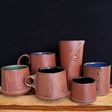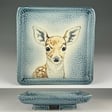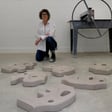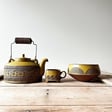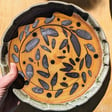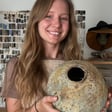Become a Creator today!Start creating today - Share your story with the world!
Start for free
00:00:00
00:00:01

I was up at 4 in the morning one day...
In this episode, Nic Torres shares a personal anecdote about being kept awake by loud rain and a dripping sound, leading to random thoughts and ponderings about water and the scientific method. He then ties this to pottery, explaining how the scientific method can be applied to pottery by creating and testing hypotheses to find what works best. He emphasizes that treating pottery as a series of experiments can make the process more enjoyable, help discover one’s unique voice, and lead to continuous improvement and innovation.
Get your 53 themes by clicking this link shapingyourpottery.com/53themes
For more episodes go to shapingyourpottery.com
Transcript
Introduction to Pottery Themes
00:00:00
Speaker
Hey, real quick before we get started, if you would like to find your own theme for your pottery so you your voice really stands out and you're not getting bored with making the same thing over and over again, I put together 53 themes for you guys and it's completely free. All you have to do to get it is just go to shapingyourpottery dot com slash fifty three themes that's shapinguppotterty dot.com forward slash themes. I'll see you guys in there.
00:00:30
Speaker
If you love pottery and want to take your skills to the next level, you're in the right place. Find your own pottery style right here on Shaping Your Pottery with Nick Torres. Let's get started.
Reflections on Rain and Science
00:00:42
Speaker
What is up, Shaping Nation? It's Nick Torres here. And the other day, I was up at like four in the morning because it's been raining a lot where I live. And in my house, you could hear literally everything, like the rain is like super loud in my house. So it woke me up in the middle of the night. And As I was trying to fall back to sleep, which I really kind of couldn't couldn't do, I ended up staying up, but I digress. I was sitting there pondering just a bunch of just random thoughts because I kept hearing one little drop that I thought was like a leak somewhere in my house, but it's not a leak. It's like somewhere outside. I just don't know where it's at. And I kept hearing like one drop like bloop.
00:01:26
Speaker
over and over and over again. And I think that was making it harder for me to fall asleep. And as that drop was happening, I had a thought in my head and thought was, if you freeze water, do you gain more water or do you? Is it the same water when it melts?
00:01:45
Speaker
So I had that thought in my head and I started going through that. Like my hypothesis was that you will actually have the same amount of water, even if it's frozen. right And I'm pretty sure that's what it is. I haven't actually tested it yet. But, you know, it's just one of those random thoughts you have in your head. And as I had that thought in my head.
Scientific Method in Pottery: A Guide
00:02:05
Speaker
I began thinking, like, you know, the scientific method that we learned in school can actually be used in pottery. And. You know, you go through the scientific method that first you go, you set up your your hypothesis, whatever that is, for trying to work with, you know, maybe you are you are trying to add sculptures to your pottery and your hypothesis is that you need to make the sculpture first and then attach it later.
00:02:32
Speaker
Right. So that's your hypothesis. And in order to make that work, you have to run some tests. You have to run test test one where you're making a sculpture and then attaching it to the thing. Does it explode? Does it not explode? Does it work? Does it make cracks? Right. All those tests in that one little thing and then you run on go on to the next test. OK, so this it didn't it didn't work by attaching the muggies too heavy. There's a bunch of cracks. What can I do a little bit differently this time?
00:03:01
Speaker
Maybe you instead of adding so much slip to while attaching it, you you just attach it with water. That's it. Maybe it helps. Maybe it doesn't. You run the test again and same results, right? Maybe get some cracks, maybe get some some maybe the results are a little bit better, but not as good as one. So you run the next test again. So instead of this time, you just simply.
00:03:25
Speaker
Attach the sculpture to the mug where it's heavy this time you make the sculpture then you hollow it out and You attach it to the mug that way see if that helps and you run the test again and see if that helps But you still get the same results. And after a while, you get this feeling that, OK, this this technique isn't going to work. So it's time to move on to the next one. And then you build a hypothesis again and then you do the scientific method all over again and you do it again. Right. And then you find that one thing that really works, it's working and you you have a hypothesis down, you have that that thing that you touch over and over again is working.
00:04:04
Speaker
Now you start going on to broaden that test out to kind of make it a theory, make it like a law pretty much. And so now you start testing things out more, you start testing different things out so to make it more efficient, more, you make it better, to make it easier yourself, make it more fun for yourself. And you do those things over and over again.
Experimentation in Pottery
00:04:23
Speaker
And that's why takes the scientific method can really help you with discovering your own voice or just helping you get out of your own head a little bit with pottery.
00:04:32
Speaker
A lot of times we get so focused on one thing. We get so focused on either we get bored and we're not seeing the result fast enough or we start focusing on trying to sell our pottery or whatever it is, and probably start focusing on that one thing too much.
00:04:50
Speaker
and that we forget the pottery is all about a test. It's literally just testing things out and see what works and and whatever works for you and whatever you're like enjoying, continue doing those things. But you don't find that out by simply just one day popping into the pottery wheel and then boom, you find that thing. You do it by doing a bunch of tests. You create a hypothesis. You create you you have ideas for this hypo hypothesis and you keep going and going and going and testing it out. And that's how you find your voice by testing it out more and more and more.
Creativity and Outlandish Ideas
00:05:20
Speaker
right your idea could be out of this f freaking world it literally like i'm making a hanging astronaut that is that is you know it's fighting a monster right and it's lit at the same time That's a pretty yeah outrageous idea. Now, write down to how you're going to make that idea come to life. Right. What is your hypothesis? Your hypothesis could be, OK, so if I want to make this idea come to life, I think I need to first make a a background for the sculpture.
00:05:51
Speaker
And then second, I need to add a the idea, sculpt the action, and then I need to sculpt the monster and then I need to attach them to the platform and add some strings to the thing, whatever it is. And then you run that test so that you see if it's actually going to work.
Pottery as an Enjoyable Test
00:06:08
Speaker
By thinking of pottery as a test, it becomes one, more enjoyable, two, you get to free yourself up from those burdens that you feel around pottery sometimes when you feel like you have to sell your pottery or you have to make the best pot possible at every single time. That's not true.
00:06:26
Speaker
If you treat pottery like a test and run through the scientific method and you're going to have a lot more fun, you're going to be able to do a lot more cooler things as well in pottery simply by treating it as a test. And I hope that you start treating pottery like a test because that's how you are going to grow your pottery skills. Hope you guys enjoy this episode and I'll see you guys in the next one.
Conclusion and Call to Action
00:06:50
Speaker
Thanks for listening to this episode of Shaping Your Pottery. If you are struggling with finding your own theme for your pottery so that you know you are known for something,
00:07:03
Speaker
I put together 53 themes that you can use and you can take. All you have to do is go to shapingyourpottery.com forward slash 53 themes. That's five three themes to get these 53 themes. It's really important for you to find a theme for your pottery so that you're not going to get burnt out. you You can have multiple styles with your pottery and you can be known for something. So again, go to shapingyourpottery.com forward slash 53 themes, that's five, three themes to get these 53 themes. Thanks guys, I'll see you guys next time.

